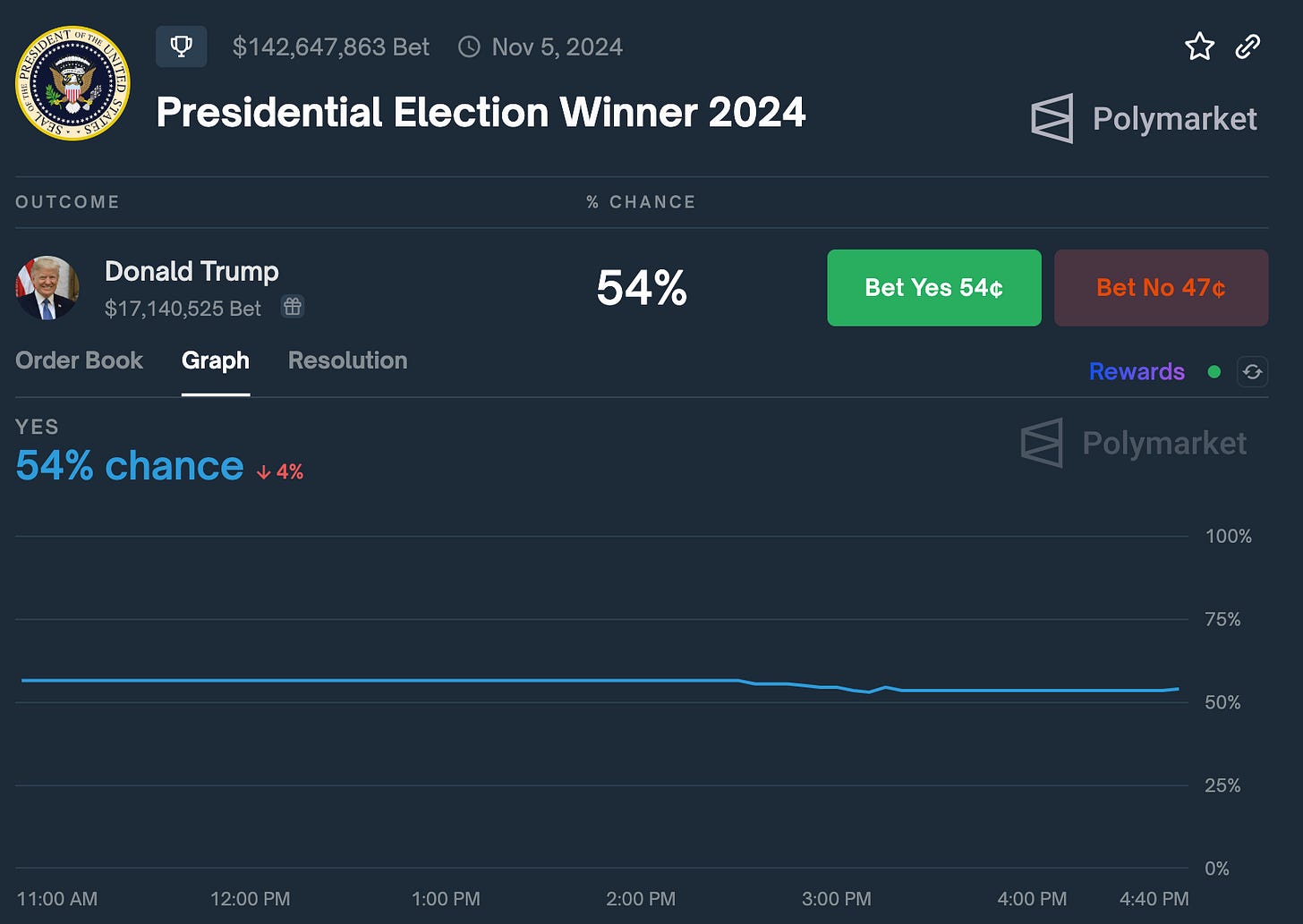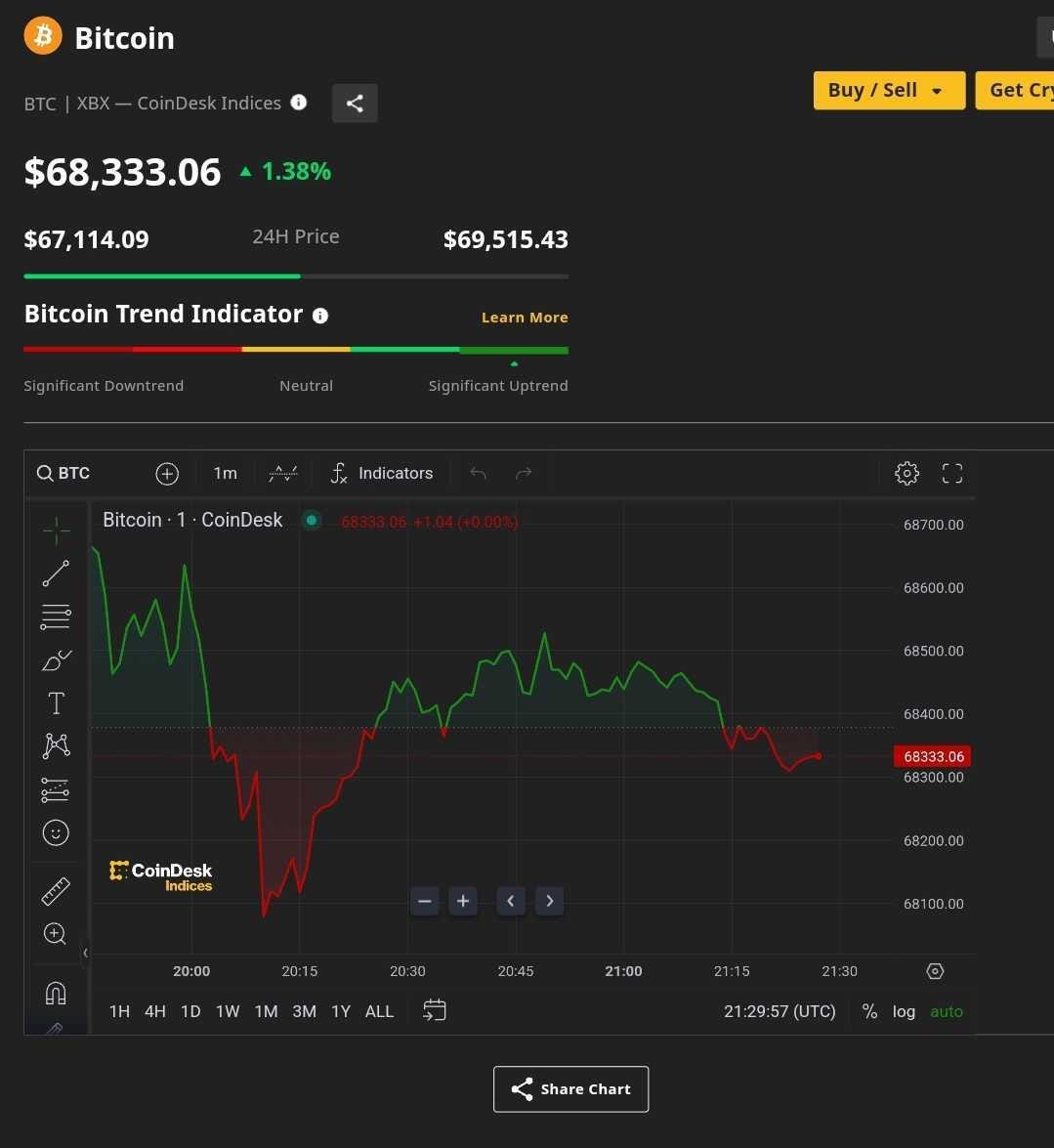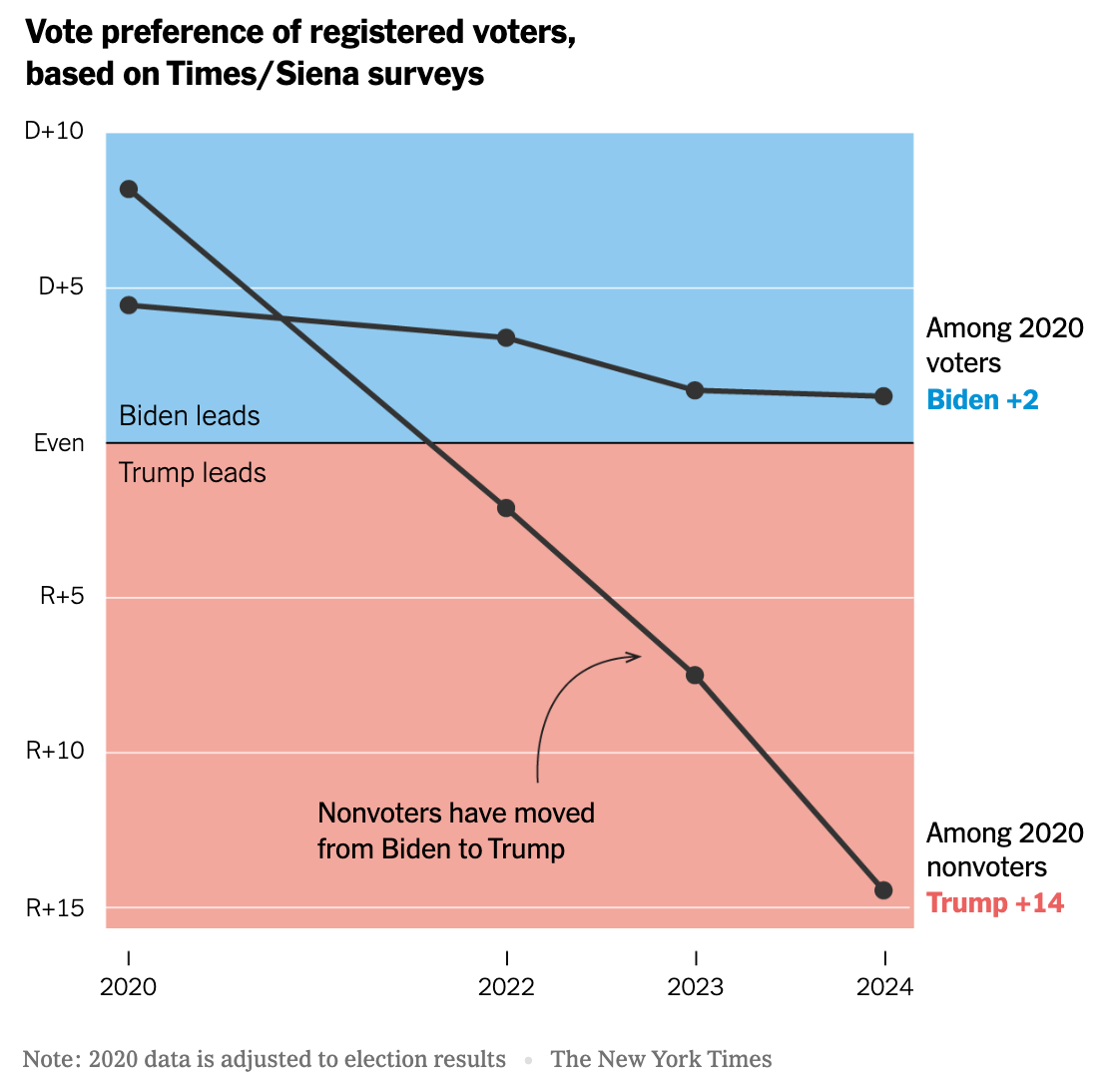How much will Trump's conviction harm him? Watch low-information voters.
Partisans are going to partisan. But they're not the votes that matter.
Former President Donald Trump, the presumptive Republican nominee, was convicted on Thursday by a Manhattan jury on all 34 counts in a felony case involving hush money paid to the porn star1 Stormy Daniels. Trump is the first US president to be convicted of a crime.
Trump is likely to appeal the verdict. Although in principle Trump could face prison time for the charge, legal experts and prediction markets estimate that such an outcome is unlikely.
I haven’t been closely following the details of the Daniels case, and I don’t want to be one of those writers who fakes his way through a story that he hasn’t been analyzing closely. So I’m not going to talk about the legal aspects of the case or What It All Means for American democracy. And I wrote this up quickly, so there may be even more typos than usual. Still, perhaps I can provide some value by relating some general principles about polling and the formulation of public opinion — and at least calibrate against some hyperbolic reactions I’ve seen elsewhere.
For instance, you don’t have to look that hard to find people who claim the conviction will actually help Trump — or alternatively, that the verdict is such a big deal that you might as well throw out all of your previous assumptions about the race.
Look, this is an unprecedented circumstance, and there’s no good way to rigorously model the impact. Everybody is just guessing. Would it utterly shock me if Trump actually gained in the polls — or if there were some massive unmistakable shift toward Joe Biden from which Trump never recovered? No, it wouldn’t shock me, I guess. But I’m not a person who is easily shocked. I consider these outcomes to be on the tails of some probability distribution — with the fat part of the curve centered around this being moderately helpful to Biden.
Prediction markets mostly think the same way. At Polymarket, Trump’s chances of winning the Electoral College fell from 56 percent to 54 percent after the verdict:
In the composite odds tracked by ElectionBettingOdds.com, the numbers are similar, with Biden up by around 2 points and Trump down by about the same amount. Bitcoin prices — which as Maria and I talked about on this week’s episode of Risky Business, probably see Trump as more favorable to their cause — fell on the news, though only slightly:
That impact might seem small, but it isn’t nothing, especially considering that these markets had already regarded a conviction in the Manhattan case as being more likely than not (meaning that the outcome was somewhat priced in). And keep in mind that there was downside risk for Biden, too — an acquittal, or even a hung jury, would almost certainly have qualified as good news for Trump.
The case for the verdict having a larger impact rests partly on polls showing that a fair number of voters had said they’d switch their votes in the event of a Trump conviction — but these probably should not be taken quite at face value. As I wrote last month, voters are generally bad at answering hypotheticals. And as my former colleague Nathaniel Rakich points out, a lot of people who had said they’d switch their votes didn’t go from Trump to Biden but instead from Trump to undecided — Trump will have a chance to win them back. Moreover, as Harry Enten (another former colleague!) has noted, Trump’s numbers hadn’t been negatively affected while the trial was underway — and the public had treated the case as a relatively low priority. The most recent polling had also shown less of a prospective impact than some of the earlier data.
But the fact that the public has been relatively inattentive to the trial does not necessarily strike me as good news for Trump. Traders at prediction markets might have anticipated this outcome — but polls show that most voters did not. It represents a material change in their state of knowledge about the election.
Now, obviously, it’s not as though Trump had some squeaky-clean image. If we applied a “scandal” flag to presidential candidates, like we did for Congressional candidates in the 538 midterms model, Trump would already have been tagged with it many times over. And the Manhattan case was certainly not the most important of the several trials against Trump. Something I suspect nearly all Americans can agree upon is that trying to overturn an election is several orders of magnitude more important than paying off a porn star.
Nevertheless, nearly every voter is going to see a headline like this one today or tomorrow — even if they’re reading relatively conservative publications like the New York Post:
And my question is what sort of impact these headlines will have on these relatively inattentive voters — the sorts of voters who won’t care very much about the cable news spin because they lead happy, fulfilling lives and aren’t watching cable news to begin with.
In the headline, I described these as “low-information voters”, but that isn’t intended as a put-down. It doesn’t mean these people aren’t intelligent. Being deeply engrossed in politics is actually a relatively unusual hobby, and I’m not sure it’s a healthy one. It is a perfectly rational choice to spend your time on other things. It is not even clear that voting is rational by the stricter definitions of that term, especially if you’re not in a swing state.
Nevertheless, many people who are only mildly interested in politics do vote out of a sense of duty. And they often rely on stylized facts about the candidates that don’t necessarily match the more nuanced reality. One reason that Biden’s age is such a problem for him, for instance, is because it translates well into being a stylized fact — 81 is awfully old for a president or any person in a position of remotely as much executive authority (and Biden often looks and acts his age). The simple heuristic DON’T VOTE FOR AN 81-YEAR-OLD goes pretty far.
But likewise, the heuristic DON’T VOTE FOR A CONVICTED FELON goes a long way, too. It’s a simple, irrefutable fact. Undoubtedly, Republican operatives will try to spin this fact away, but they may only get so far.
And these disengaged voters matter because they’re the ones who have trended strongly away from Biden since 2020:
These are the voters most likely to be concerned about things like inflation, Biden’s age, or who are perhaps reacting to counterbalance what they perceive as a leftward shift in the country on issues like immigration, policing and identity politics. They may react to New York Post headlines in a way they never would to the umpteenth Congressional hearing on Trump’s behavior or some pundit with a bowtie on MSNBC.
Or not. The heuristic “LOL, nothing matters for Trump” has been a reliable one too, after all.
We’ll get more evidence soon in the form of polls, although I’d be cautious about interpreting them. This might be a case where we see partisan non-response bias — Democrats will be excited about the verdict and more likely to pick up a pollster’s phone call, while Republicans will turn their attention away from politics for a period of a few weeks. Pollsters struggle to correct for this — I don’t want this to turn into a discourse on polling methodology, but I suspect that some overcorrect for it while other firms undercorrect.
And many surveys — excluding perhaps the most expensive ones that repeatedly call respondents in an effort to cast as wide a net as possible — can have trouble reaching the marginal voters who are most likely to have their voters impacted by the verdict. So over the next several weeks, I’d pay an especial amount of attention to pollster quality.
My expectation is that Biden will see some improvement in his numbers — perhaps something roughly equivalent to a mini convention bounce — and the question is mostly about how steep it is and how long it persists. In particular, I’ll want to see whether any decline for Trump survives past the first debate on June 27 or instead the debate reverts the race to where it was previously.
If there isn’t some sort of bounce for Biden, however — even a temporary one — then obviously that will count as a highly bearish signal for him. Improved consumer perceptions about the economy haven’t really improved Biden’s numbers much, and nor has a period of comparatively favorable news coverage. (The “vibes” within the pundit class don’t translate in any reliable way to those among swing voters.) The poker term for being in a dicey spot but where your odds have a chance to improve is “having outs”, meaning that you might catch some good cards to redeem your position. The possibility of a criminal conviction was one of the best outs Biden had left — and if it doesn’t move the numbers, I’m not sure what will.







Word is that A. G. Sulzberger’s decided that they’re going to say that Stormy Daniels worked in the “jizz biz.” Silver Bulletin should update its nomenclature accordingly.
I believe from obviously anecdotal evidence that there are many informed individuals such as myself that this verdict will make us more likely to vote for Trump rather than stay home, I could never vote for Biden , not only his increasing senility but his horrific economic and foreign policy blunders make me abhor him and fear for our country if he and then slots certainly Kamala are in the Oval Office for the next 4 years. In addition, I think that it is highly likely that given their desperation Biden and his surrogates will overplay their hand regarding this verdict I am in favor of the majority of Trump’s policies, but his actions and bombast have always completely turned me off, he has been his own worst enemy in that regard. But as someone who has followed this trial and has been a political junkie for approximately 70 of my almost 82 years this charge, trial, incredible bias and incredible conflict of interest of the judge combined with the incredibly unfair verdict have clearly convinced me to support Trump against the elites in the best way possible, by voting for him in no spite of my qualms.
The other unknown for all of us is, of course who he picks as his VP running mate, and how that might gain him a lot of additional paid media and accentuate the divisions in the badly fractured Democratic electoral base.